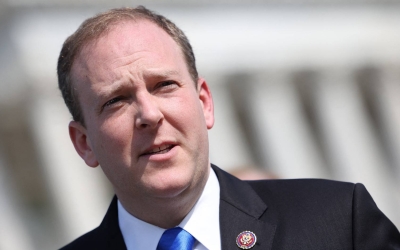US court upholds Arkansas law restricting Israel boycotts

A US federal appeals court upheld an Arkansas state law requiring all public contractors to promise they won't boycott Israel, overturning an earlier ruling that the legislation violated the First Amendment.
The ruling by the US Court of Appeals for the Eighth Circuit is a major victory for pro-Israel activists who have pushed around 30 states to adopt anti-BDS laws.
The Boycott, Divestment, and Sanctions (BDS) movement is a non-violent initiative that seeks to challenge Israel's occupation and abuses of Palestinian human rights through economic, cultural and academic boycotts, similar to the successful boycott campaigns of apartheid South Africa.
In 2017, Arkansas had mandated that all public agencies not do business with contractors unless they affirm that they do not boycott Israel.
The Arkansas Times, a small newspaper, challenged the legislation in 2018 when a state college refused to continue advertising with the paper until it signed an anti-boycott pledge. The Arkansas' law requires contractors with the state to reduce their fees by 20 percent if they don't sign the pledge.
New MEE newsletter: Jerusalem Dispatch
Sign up to get the latest insights and analysis on Israel-Palestine, alongside Turkey Unpacked and other MEE newsletters
On Wednesday, the court found that the legislation fell within the state's power to regulate commercial activity and did not infringe upon constitutional free speech protections.
Alan Leveritt, the publisher of the Arkansas Times, said in a statement that while the decision was expected, the newspaper would not take a "political position in return for advertising".
"We are obviously disappointed and note that these laws, which were originally passed in over 30 states, have been overturned in every court except this one," Leveritt said.
"We consider being banned from doing business with our state government for refusing to sign a pledge not to boycott Israel a ridiculous government overreach that has nothing to do with Arkansas."
Brian Hauss, a staff attorney for the American Civil Liberties Union, said that the judges' opinion was wrong, adding that they intend to appeal the case at the Supreme Court.
"It ignores the fact that this country was founded on a boycott of British goods and that boycotts have been a fundamental part of American political discourse ever since," Hauss said of the decision.
"We hope and expect that the Supreme Court will set things right and reaffirm the nation’s historic commitment to providing robust protection to political boycotts."
Free speech and Palestinian advocacy groups have slammed the growing number of anti-BDS bills in state legislatures, accusing sponsors of legislation that tries to muzzle criticism of Israel at the expense of the US constitution.
Free speech advocates have meanwhile continued to argue that the laws are in violation of the constitution and that the same legal framework is also being used to stifle speech in other areas of activism, such as climate activism.
Meanwhile, similar anti-boycott laws in Arizona, Kansas and Texas that were blocked were later allowed to be enforced after lawmakers narrowed the requirement so it applied only to larger contracts. Arkansas’ law applies to contracts worth $1,000 or more.
Citing its anti-boycott law, Arizona last year sold off millions of dollars in Unilever bonds over Ben & Jerry’s - its subsidiary - decision to stop selling its ice cream in Israeli-occupied territories.
Middle East Eye delivers independent and unrivalled coverage and analysis of the Middle East, North Africa and beyond. To learn more about republishing this content and the associated fees, please fill out this form. More about MEE can be found here.





